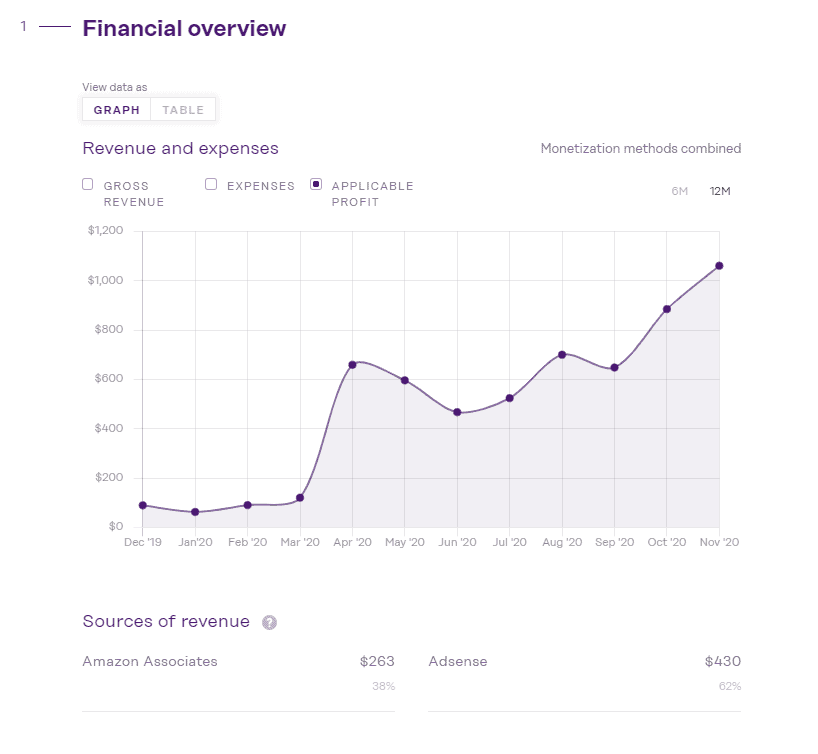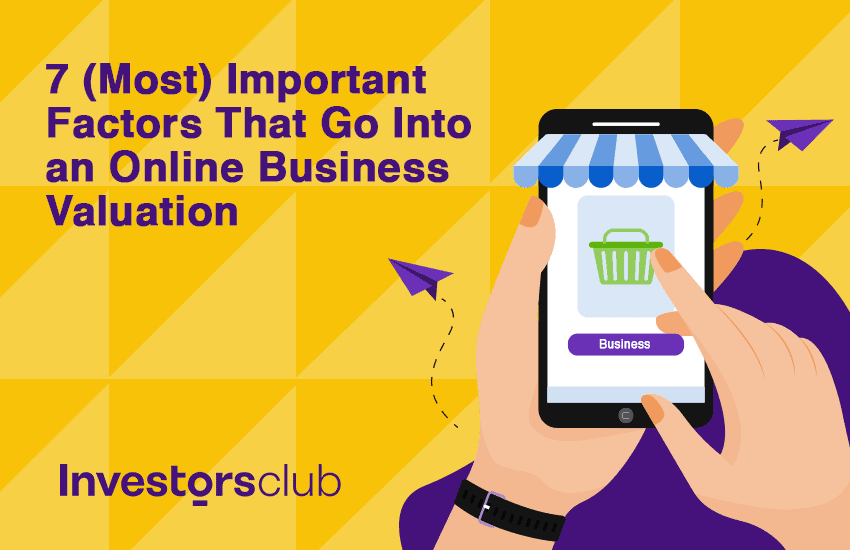The purpose of this guide is to help you understand the process behind how a website or online business typically gets evaluated to determine a fair market value.
Now this is by no means a strict list, there are obviously other factors. But I thought it would be a good idea to highlight the top 7 most important factors, so let’s get into it.
1. Earnings
This is essentially why we’re in this business. But the important thing to consider here is are these:
- Consistency of earnings over the last 3, 6, or 12 months
- Recent earning trends:
- Has the site been growing month-on-month or declining?
- Are there seasonal fluctuations?

2. Traffic
Generally speaking, the more traffic a site gets, the better. But it’s also important to consider the following:
- The type of traffic. If a site gets a lot of visitors that are not highly targeted, this should raise the red flag for spam. Conversions will likely below. In this instance, expect this to negatively affect the value.
- Traffic diversity. Organic channels will no doubt be more valuable than social channels. However, the wider the mix, the more diversified, thus the higher the valuation will be.
- Traffic trends over time. For e.g. how did the site stack up against past Google updates? Did it suffer, or did it earn more rankings?
- Seasonal trends
- Local or international reach? A fairly strong presence in multiple countries will indicate to potential buyers the online business is recognized globally.


3. Monetization method
There are several methods in which a site can monetize its traffic. These can include any or a combination of the following methods:
- Display advertising (Adsense, Ezoic, Mediavine, Adthrive)
- Amazon associates
- Other affiliate programs
- Direct advertising deals
- Guest/sponsored posts
- Lead generation
How many ways a site monetizes its traffic is equally as important as its earnings.
Diversification of earnings is key.
Making sure you’re not putting all of your eggs in one basket is a sure-fire way of increasing a site’s valuation.
On a side note, if you’re well versed in the affiliate marketing world, you would’ve heard about the cut that Amazon made to its commission rates earlier in May this year.
This p*ssed off a lot of affiliate marketers out there, as they practically saw their earnings dramatically decline overnight, resulting in valuations to be cut significantly. Having a diversified set of revenue streams limits the damage caused to a website’s valuation.

4. Site age
The longer a site has been around the better. Why? Because if a site can stand the test of time and multiple Google updates, then it clearly has established a defensible position.
This gives prospective buyers the confidence they can acquire an online business without the fear of it losing its value in the short term.
5. Assets included
These are ultimately the things that come with the site as part of the potential sale. These include, but not limited to:
- Domain. For obvious reasons.
- Social media accounts. If a site gets a ton of traffic from Pinterest, this will be taken into consideration as part of the valuation process
- Email list. Ever heard of the saying “the money is in the list”? This will likely be a contributing factor to a favorable valuation.
- Content (published and unpublished). Although not a huge factor, there is a degree of value to be had with content. It’s valuable because of the time and effort that goes into producing it. Sites with high-quality linkable content will generally outlast sites with relatively poorer quality.
- Affiliate accounts. If these have higher than normal payouts, this puts the site’s valuation in a uniquely strong position among other sellers.
- Ad network accounts. Same reasons as affiliate accounts, preferential rates will help.
6. Domain Health
One of the factors that determine whether a site has value is by the overall health of the domain by checking:
- If the backlink profile is healthy;
- Identifying whether the site was built on an expired domain;
- Learning if the site uses public blog networks (PBNs) and niche edits
If a site is built on a domain that has a lot of strong links, a decent domain authority (DA) or trust flow (TF), and uses mainly whitehat methods to generating traffic, it’s highly likely that the domain will hold it’s value.
On the flip side, if a domain has backlinks that appear to be spammy, then this gives prospective buyers less confidence knowing that someday they could get the slap from Google.

7. Growth potential
Niche Trends
The popularity of specific niches plays a big role here. For example, if a site about Cryptocurrency was being listed during a bull run and general sentiment was at an all-time high, this might make you think the site should hold value.
But what if there’s a crypto-crash further down the line? How much impact would that have on the site? Again, this is something to bear in mind.
It is important to determine whether or not a niche is growing, being played out, or just purely seasonal. Any one of these factors will decide how valuable a website is.
On-site improvements
Can the site be optimised with better content, faster load speeds, improved conversions, a better-utilized email list or benefit from targeting ad placements?
Off-site improvements
Similarly to on-site improvements, are there more link building opportunities? Could the site benefit from more guest posting?
If the answer is yes to one or more of them, chances are this will put a site in a much stronger position as it paints a better picture to prospective buyers of what the possibilities are for future growth.
Conclusion
There you have it, those are the 7 most important factors that go into a website’s valuation. For sellers, this should provide an outline of what needs to be done in order to get the strongest and most rewarding valuation possible. On the other hand, this is essentially a guide into what we go through when we evaluate sites on our marketplace for potential buyers.
If you’re interested in getting a valuation for your website, why not try our free estimation using our valuation tool here, or submit your site to our marketplace for a more in-depth quote?

Senior Digital Marketing Specialist
Full-Stack Growth Marketer & Consultant | Marketplaces, Lead Gen & E-com | ex Growth Director @ Investors.club (Scaled 0-20k users in 2.5yrs).
Connect with Chaz:
Linkedin

